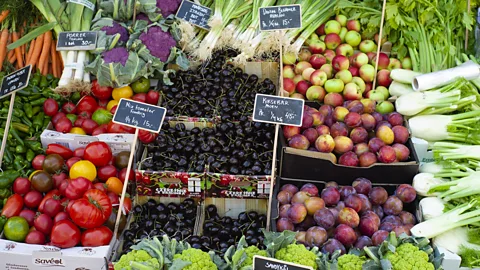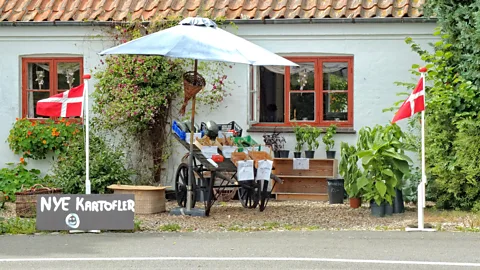Denmark: The major pork producer trying to wean itself off eating meat
 Getty Images
Getty ImagesThe world-first Danish strategy to encourage plant-based foods may contain a lesson for other nations looking to cut back on meat: build new demand first.
Trine Krebs adores vegetables. "When I get a plant in my hands that I can feel is healthy, I can smell it, feel it, almost taste it in my mouth," the 47-year-old, cardigan-clad farmer enthuses over Zoom.
Described affectionately by some as "Miss Dry-Legume of Denmark", Krebs has won awards for her advocacy of plant-rich – or "plant-rig" in Danish – diets. To this end she has run food festivals, trained cooks and invented songs. She even appeared on a Danish dating show, Farmer Looking for Love, and taught her prospective romantic interests to cook legumes: the first refused, the second was luke-warm, but the third was totally won over. "He thought it tasted amazing and wanted me to teach all his friends."
Yet not all in Denmark share Krebs' ion for pulses. The majority of Danes – 57% – say they have no interest in reducing the amount of meat they consume, making it the European nation least interested in cutting back. This reluctance stands in tension with science showing livestock's impact on the planet: animal-based foods cause twice as many emissions as plant-based ones, and pose major threats to forests and biodiversity. It also runs contrary to Denmark's new dietary guidelines, which recommend just 350g (0.77lb) of meat per week. Most Danes eat three times that amount (for Americans, it's three and a half).
The reasons for this reticence could have deep roots. "In our brains we're still on the savannah trying to survive," Krebs suggests. She points to how Western diets have become high in simple sugars, fat and meat, especially in colder parts of Europe, while noting that more recent cultural history may also play its part. "As in Britain, Denmark once had big, historic households of nobles with beautiful gardens filled with the best fruit and veg. Then that disappeared," she says. Now, instead of being seen as "sexy", vegetable dishes are too often considered a dull necessity, added to a meal "for health not pleasure".
The Danish government, however, has a plan for change. In a world first this October, Mette Frederiksen's istration published a national roap for plant-based food. The 40-page document lays out the country's commitment to normalising plant-rich diets, as well as to incentivising the production of more vegetables and alternative-proteins. Under its recommendations, which cover the entire food chain, everything from organic root vegetables to processed dairy substitutes and fermented fungi are to be ed. Meat and dairy do not have to be entirely off the menu, but the aim is for them to play a less dominant role.
 Getty Images
Getty ImagesWalter Willet, a professor of nutrition at Harvard University who led the Eat-Lancet Commission's report into the optimal diet for a healthy planet, is "impressed" by the step and knows of "no other government" that has implemented such a national-level plan. "We should not be surprised that Denmark has taken a lead in this effort; they were a decade ahead of other counties in banning trans fat, and have been a global leader in developing green energy," he notes.
